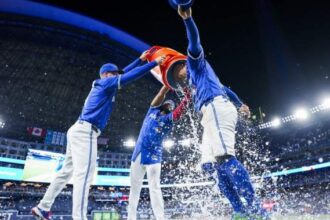There’s something poetic about baseball in late spring—that moment when the season has settled in but hasn’t yet revealed its full narrative. Last night at the Rogers Centre, George Springer provided one of those crystallizing moments that remind us why baseball’s deliberate pace can suddenly accelerate into pure electricity.
Springer, the veteran outfielder whose presence in the Blue Jays lineup has been both a blessing and occasionally a question mark due to injuries, delivered a performance that echoed his Houston glory days. With two thunderous home runs that cut through the humid Toronto air, he single-handedly transformed what had been a tense pitching duel into a comfortable 5-2 victory over the visiting Oakland Athletics.
What makes Springer’s multi-homer game particularly compelling isn’t just the statistical impact, but the timing. The Blue Jays have been searching for offensive consistency this season, often relying too heavily on isolated bursts of production rather than sustained pressure. Baseball, perhaps more than any other sport, is a game of psychological momentum—and Springer’s power display provided exactly the kind of emotional catalyst this team has been seeking.
“Sometimes you need your veterans to show the way,” manager John Schneider told reporters after the game, his typically measured tone betraying a hint of relief. “George has been through every situation in this game, and tonight he reminded everyone why he’s been such a valuable addition to this organization.”
The Athletics, continuing their season of transition and rebuilding, showed flashes of the competitive spirit that occasionally makes them more dangerous than their record suggests. Their young pitching staff kept Toronto’s lineup mostly in check until Springer’s second blast in the seventh inning effectively sealed their fate.
For Toronto fans, whose relationship with this talented but sometimes frustrating team has been complicated in recent years, moments like these offer a glimpse of what could be. The Blue Jays’ roster, on paper, remains one of the most talented in the American League. Yet the gap between potential and performance has been the storyline that won’t quite disappear.
Beyond just the scoreboard impact, Springer’s performance serves as a reminder of baseball’s peculiar beauty—how a player can struggle for weeks and then, in the span of two at-bats, recalibrate both his season and his team’s trajectory. His first home run, a line drive that barely cleared the left-field wall, was a testament to his compact swing and perfect timing. The second, a towering shot to straightaway center, demonstrated the raw power that made him one of baseball’s premier leadoff hitters during Houston’s dominant run.
What’s next for the Blue Jays remains the question that has hovered since opening day. Is this the beginning of the offensive awakening the team has been waiting for, or simply another tease in a season that has thus far refused to follow any consistent pattern? At the very least, Springer’s night provides a template for what this lineup is capable of when firing on all cylinders.
For now, Toronto can savor a victory that felt more significant than just one mark in the win column. In baseball’s long season, sometimes a single night can change the atmosphere around a team. Whether Springer’s power display becomes that inflection point or merely a pleasant memory in a middling season remains to be seen.
But for one night at least, the veteran outfielder reminded everyone in the Rogers Centre of baseball’s captivating simplicity: Sometimes, all it takes is one man with a bat, perfect timing, and the ability to change a game’s entire complexion with a single swing.










